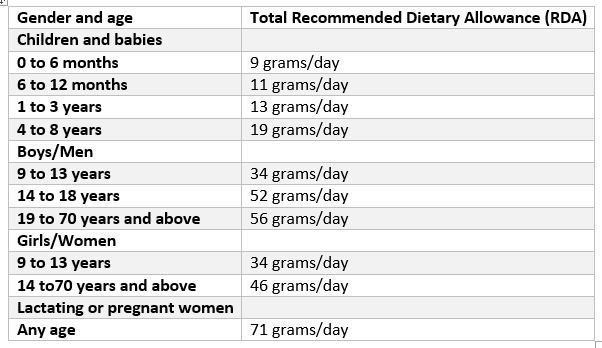
Protein is the main
component of your enzymes, hormones, organs, bones, skin, muscles, and other body parts. Protein constitutes between 14 to 16 percent of your body mass.
Your body uses protein to build and repair cells.
Protein is a very important nutrient. It is made up of amino acids. Your body can only synthesize some amino acids, but there are nine amino acids that the body cannot synthesize. For this reason, you need to obtain them from the foods you eat.
Protein requirement in the body
Consuming too little
or too much protein can lead to health complications. That's why you need to
calculate the right amount of protein you need to consume daily. The amount of
protein your body needs is determined by your height, gender, age, weight, and
level of physical activity.
The National Academy of Medicine recommends that an adult consume not less than 0.8g of protein per 2.2lbs of body mass (BM).
This amount is sufficient for those who lead sedentary lifestyles, i.e., not exercising. However, the amount of protein required varies for pregnant women, athletes, teenagers, those who want to lose weight, and people recovering from various diseases.
Calculating the amount of protein your body needs
Calculation by weight
To get the amount of protein your body needs daily, divide your weight (in lbs) by 20, then multiply the answer by 7. For example, if your BM is 200lbs, you'll need (200/20)x7 g or 70g of proteins daily.
A simpler way of
calculating your daily protein requirement is to multiply your BM in lbs by
0.36. So, for example, if your BM is 150lbs, you'll need 150x0.36g or about 54g
of proteins daily.
Calculation by calorie intake
If you know the number of calories your body needs per day, you can use that to calculate the amount of protein your body needs daily. It is recommended that protein form between ten to 35 percent of your daily calorie intake. So, if you need 2000 calories per day, about 200 to 700 of those calories should come from protein. To calculate the exact amount of protein you need, remember that a gram of protein has 4 kilocalories.
Sources of protein
The common sources of
protein include:
>> Eggs
>> Seafood (like oysters, lobster, and shrimp)
>> Fish
>> Duck, turkey, and chicken
>> Pork, lamb, and beef
>> Tempeh
>> Tofu
>> Quinoa or soy
>> Beans and legumes
>> Seeds and nuts
The minimum recommended daily protein intake
The chart below shows the minimum recommended daily protein intake for people leading sedentary lifestyles.

Conclusion
As already mentioned, you need to take the right amount of protein to keep your body healthy. Using the methods discussed above, you can calculate the amount of protein you need per your body weight. You can also contact your doctor or fitness expert for further guidance.
The amount of protein required varies for pregnant women, athletes, teenagers, those who want to lose weight, and people recovering from various diseases.
Downvoting a post can decrease pending rewards and make it less visible. Common reasons:
Submit